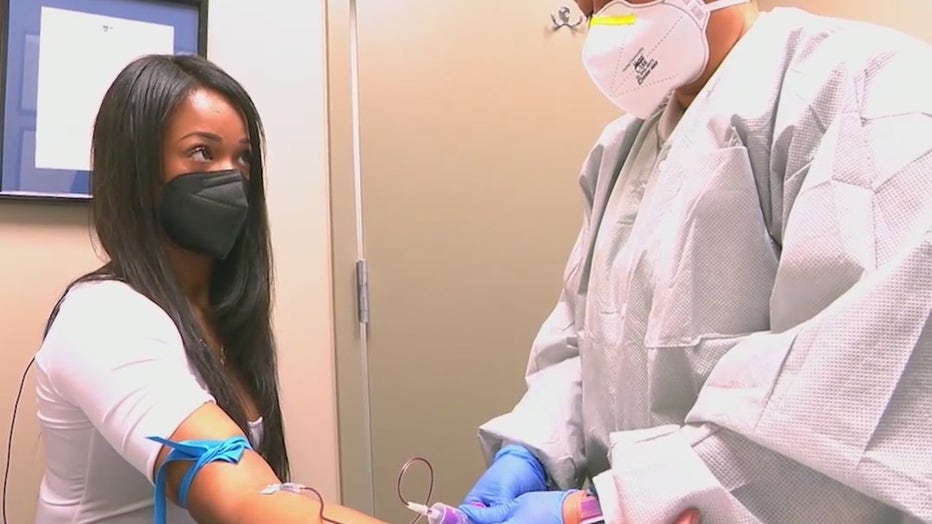If you have COVID-related brain fog, these tips from a doctor may help
Combatting brain fog in COVID long-haulers
Brain fog is one of the biggest symptoms in those with long-haul COVID-19. Researchers are working to combat the issue and to find out what causes it.
ATLANTA - It's been more than two years since 34-year-old Elana Cooper first contracted COVID-19 at her grandfather's funeral in March 2020.
She says she caught the virus again in January.
A PhD student in biomedical engineering at Georgia Tech, Cooper says she is really struggling with brain fog, one reason she came to AbsoluteCare in Buckhead, one of five long COVID clinics in Georgia.
Cooper is concerned her difficulty focusing and memory lapses may make it difficult to continue in her program.
"It kicks in at any point," Cooper says. "So, when you're in the middle of a conversation, and you have to, like, think for a word and pause, it's a little embarrassing. You're trying to find words, you're trying to think through problems, but you're moving slower, you're processing slower. And, that's hard to do in a PhD environment."
Dr. Joel Rosenstock, a veteran infectious disease physician in Atlanta, has worked with more than 150 patients with long-haul COVID at AbsoluteCare, and he says brain fog is one of the top challenges their patients face.
Symptoms can include memory difficulty concentrating, foggy thinking, confusion and headaches.
"So memory problems, automated things they have trouble with," Dr. Rosenstock says. "One of the classical findings is misnaming. So, they'll be talking, and a word will come out that's not the correct word. They misnamed the word."
There is no quick fix, or one-size-fits-all approach to easing brain fog, but Dr. Rosenstock says, several techniques have helped many of his patients.
The first step, he says, is getting your sleep back on track.
"Sleep is an absolute priority, and, if you're not sleeping because of fear and anxiety and depression, then you need to see somebody," Dr. Rosenstock says. "You don't necessarily have to go to a long COVID clinic, but you need to see your primary care doctor or your therapist or someone you trust, and work on techniques, there are many techniques, to get better sleep, and that's, that's critical."
If you are a master of multitasking, used to juggling several things at once, Rosenstock says, give your brain a break.
"You've got to stop it," he says. "You just have to stop it."
Instead, Rosenstock says, slow down and focus on one thing at a time.
"Give into your brain fog a little," he says. "Don't multitask: don't talk on the phone, while you're doing your computer and watching a movie at the same time. Those things don't work very well."
If you find yourself forgetting appointments, Rosenstock recommends making lists and creating reminders for yourself on your smartphone.

Elana Cooper gets her blood drawn at AbsoluteCare in Buckhead, one of five long COVID clinics in Georgia. (FOX 5)
Sticking up notes around your home or office can also help you stay on track.
Rosenstock says the reminders may also ease some of the anxiety that can come with memory loss.
"Whether it's work or your home life, it's to take care of those things, so that your brain can rest, so that you don't get as anxious" Rosenstock says. "Because, think about it. Just the anxiety related to 'I'm not thinking as well..." It's a vicious cycle."
At AbsoluteCare, Rosenstock recommends patients experiencing brain fog use BrainHQ.com, a subscription-based website that offers games and puzzles designed to exercise the brain.
Patients fill out a questionnaire to narrow down their cognitive challenges, then use the website for 10 minutes twice a day.
But, instead of playing games you are good at, Rosenstock recommends choosing ones that will challenge you.
"So, if you really like crossword puzzles, and you used to do them, don't do crossword puzzles, because that's your sweet spot," Rosenstock says. "Maybe you should do Sudoku, or something that you would not do, because that makes your brain think outside its comfort zone."
Rosenstock says he has seen claims on social media that supplements can ease brain fog.
"People will say vitamin D and vitamin C, and zinc and magnesium (can help)," he says. "Nothing has been shown as of yet, and they've been studying many of these things, but nothing has been shown in any evidence-based study to really change things."

